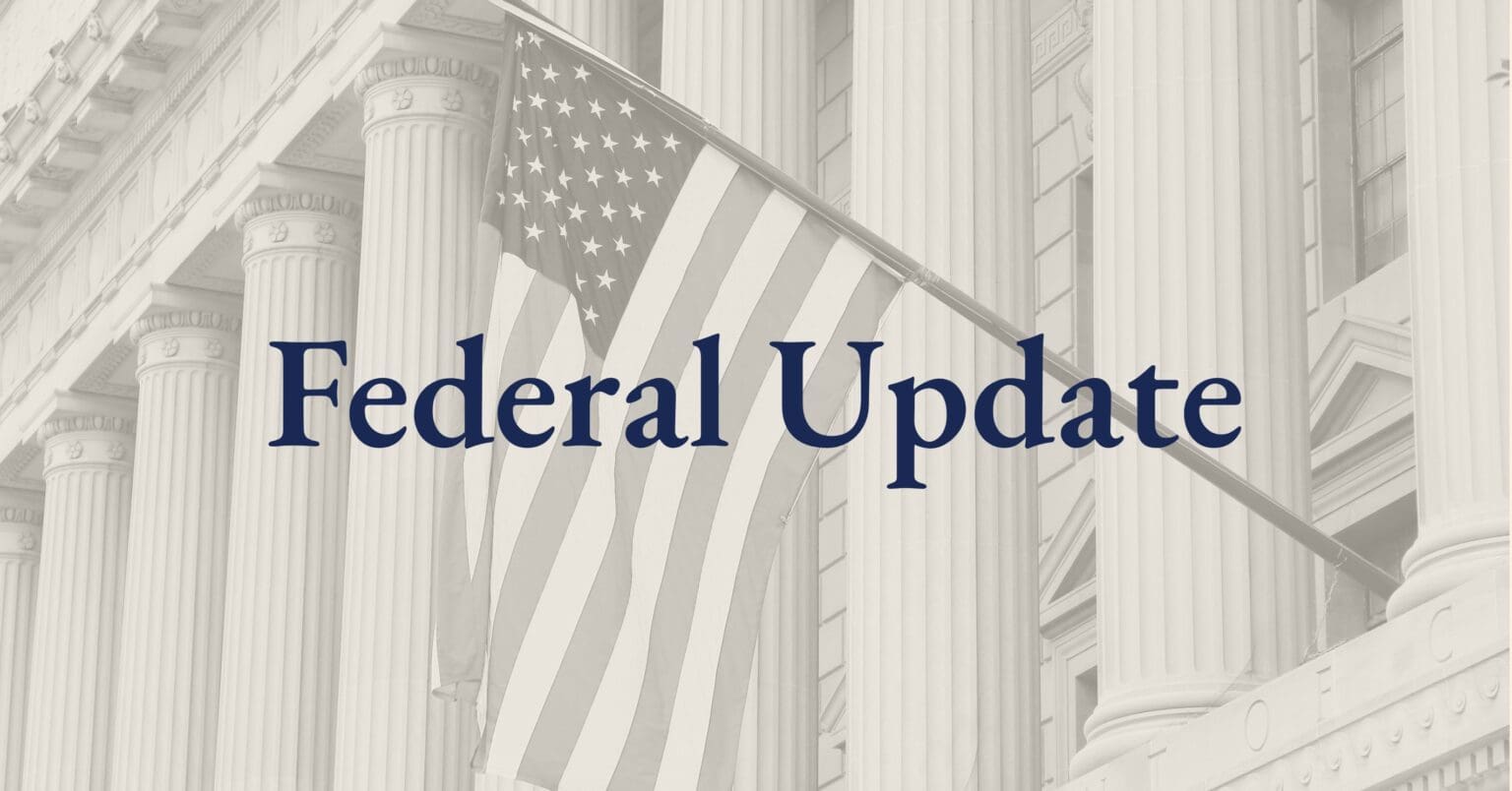Federal Update: Government Shutdown Ends as Congress Finalizes Funding Package
Back to News
After the longest shutdown in American history, the federal government has officially reopened. On November 12, the House gave final approval to the funding package (P.L. 119-37) in a narrow 222–209 vote, with six Democrats joining all but two Republicans in support. The measure, which the Senate had cleared earlier in the week, was signed into law shortly thereafter, restoring government operations and ending the 41-day lapse in appropriations.
P.L. 119-37 will extend current spending levels for most agencies through January 30, 2026, while providing full-year appropriations for three of the twelve fiscal year (FY) 2026 spending bills, including those covering the U.S. Department of Agriculture (USDA); Military Construction-Veterans Affairs; and the Legislative Branch. Among its major provisions, the enacted compromise reverses recent federal “Reduction in Force” actions, temporarily halts additional layoffs, and guarantees retroactive pay for furloughed federal employees.
Of particular relevance to counties that requested community project funding (earmarks) through the Agriculture spending bill, those allocations are now finalized, enabling eligible counties to advance their projects once federal agencies release implementation guidance and begin the award process.
SNAP/WIC and Nutrition Programs Stabilized
With full-year Agriculture Department funding now enacted, the Supplemental Nutrition Assistance Program (SNAP)/CalFresh is no longer at risk of another lapse in program operations for the remainder of FY 2026. This ensures continuity for households that rely on the program and provides stability for counties administering eligibility, enrollment, and case management functions. The new law also replenishes the SNAP contingency fund, although the balance remains insufficient to cover a full month of nationwide benefits on its own.
Earlier today, USDA issued updated guidance directing states to issue full SNAP benefits as quickly as possible. The department also confirmed that it will not pursue penalties on states that issued full benefits during the shutdown or were unable to meet standard processing or recertification timelines in November. The agency further clarified that November will not count toward the Able-Bodied Adults Without Dependents (ABAWD) time-limits, reducing the risk of unintended eligibility losses tied to the shutdown. Additional guidance is expected on Quality Control sampling and Payment Error Rate reviews.
The full-year Agriculture spending bill also provides $8.2 billion for the Special Supplemental Nutrition Program for Women, Infants, and Children (WIC), fully meeting projected caseload needs for FY 2026. It also restores the WIC contingency fund to its pre-shutdown level, offering a buffer against unexpected participation increases or another temporary funding disruption.
Negotiations over how to address the upcoming January 1, 2026 subsidy expiration will continue in the weeks ahead, and several proposals have already been introduced. For his part, Senate Minority Leader Chuck Schumer (D-NY) has proposed a one-year extension of the enhanced premium tax credits at current levels, paired with a bipartisan working group to develop long-term reforms.
Separately, Representatives Kevin Kiley (R-CA) and Sam Liccardo (D-CA) have introduced a bipartisan proposal to extend the subsidies for two years. To offset the cost, the measure would cap eligibility at 600 percent of the federal poverty level, increase penalties for fraudulent broker behavior, and tighten oversight of Medicare Advantage “upcoding.”
In addition, House Democrats have announced plans to introduce legislation to extend the ACA tax credits for three years.
Outlook
With the appropriations package now enacted into law, the immediate threat of a prolonged shutdown has been resolved. However, congressional negotiations over ACA subsidies – and several other unresolved policy issues – will continue into December.
Key Provisions in the Compromise Funding Package
- Extends funding for most federal departments and agencies through January 30, 2026.
- Provides full-year FY 2026 appropriations for the:
- Fully funds SNAP/CalFresh, WIC, and child nutrition programs through September 30, 2026.
- Extends key Farm Bill programs for one year.
- Restricts the unregulated sale of intoxicating hemp products in retail and online marketplaces.
- Ensures retroactive pay for furloughed federal employees.
- Restores federal workforce levels to the pre-shutdown status quo.
- Extends authorization for the Defense Production Act and the State and Local Cybersecurity Grant Program for the duration of the CR.
A section-by-section summary of the law is available here.
HUD Preparing Major Changes to Continuum of Care Funding
According to recent reports, the U.S. Department of Housing and Urban Development (HUD) is preparing to release a new funding notice for the Continuum of Care (CoC) program that would significantly shift how federal homelessness resources are allocated. Early indications suggest the proposal would redirect more than half of current permanent housing funding toward transitional housing programs, some of which may include work-related requirements.
HUD’s internal analysis estimates that the proposed changes could put approximately 170,000 people at increased risk of experiencing homelessness. The anticipated deadline for the next CoC funding cycle is January 23, 2026. It should be noted that this is one week before Congress must make final decisions on FY 2026 appropriations for HUD, including the CoC program itself.
The proposal has already generated a significant bipartisan response on Capitol Hill. Earlier today, 42 members of the Senate Democratic caucus – including Senators Alex Padilla (D-CA) and Adam Schiff (D-CA) – sent a letter urging HUD Secretary Scott Turner to immediately reconsider the planned changes. In October, more than 20 House Republicans – led by Representatives Andrew Garbarino (R-NY) and Nick LaLota (R-NY) – sent a similar letter expressing opposition to the proposed shift.